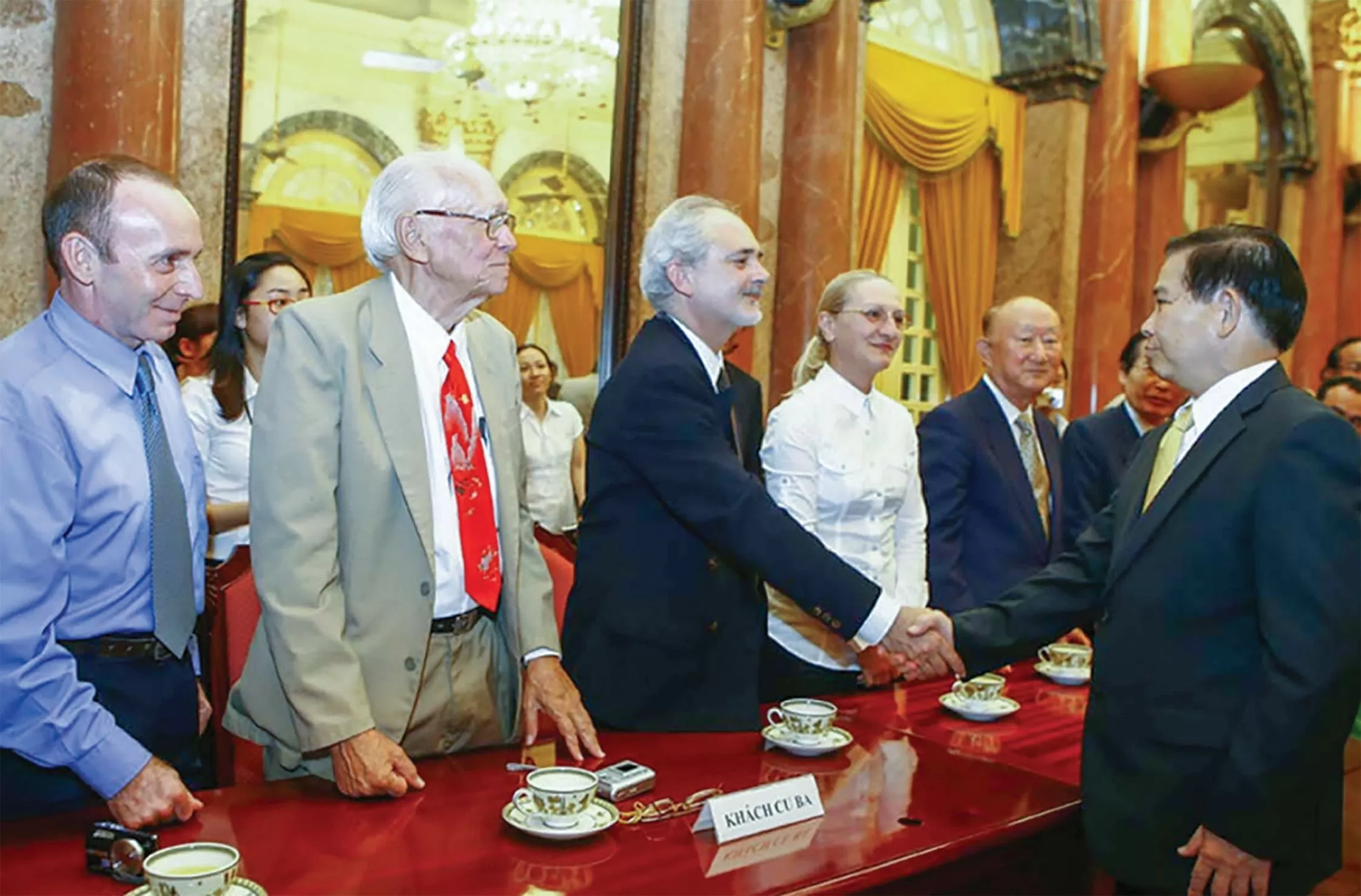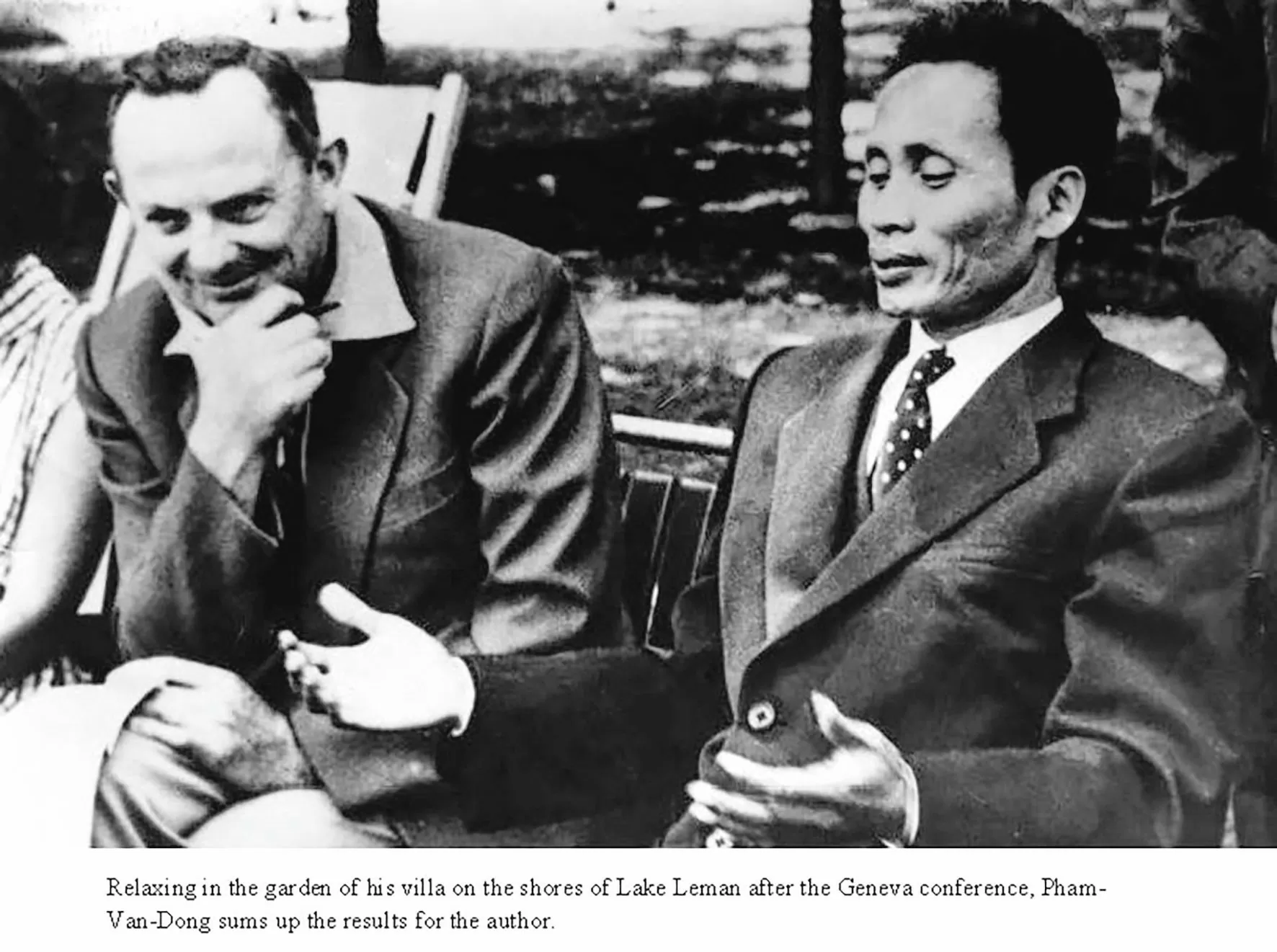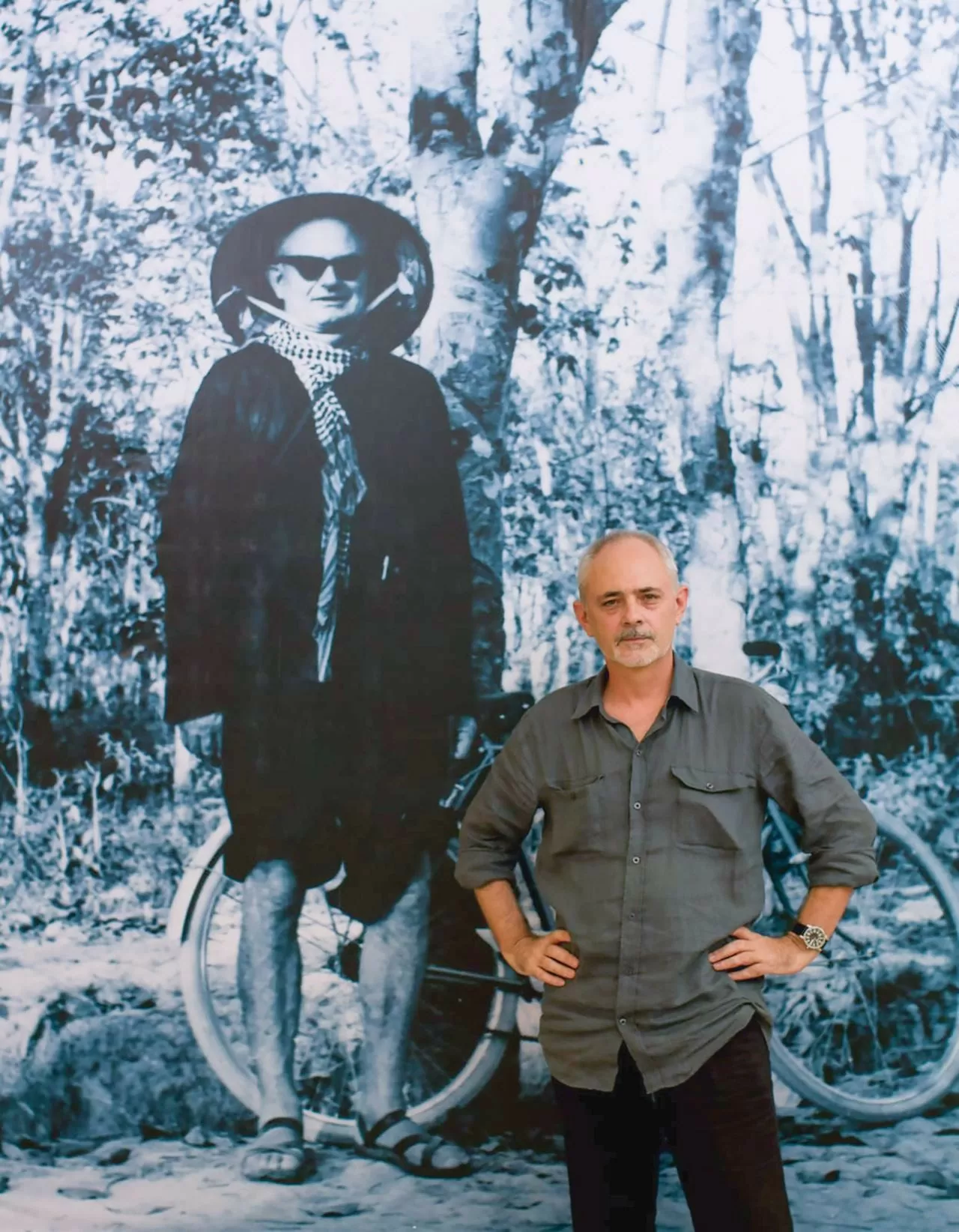
George Burchett: Happy and united, like Vietnam!
Latest
 |
| President Nguyen Minh Triet, George Burchett and his spouse - Ilza Burchett at Presidential Palace, Hanoi on September 1, 2010. |
Connecting to history
I’m sure many people have come to you to ask about your father’s works, life and career, because it is closely linked to a difficult period of Vietnam’s history. How do you feel about this?
I have co-edited two volumes of my father’s writings, Rebel Journalist – The Autobiography of Wilfred Burchett (University of New South Wales Press, 2005) and Rebel Journalism, The Writings of Wilfred Burchett (Cambridge University Press, 2007). I have also organized an exhibition of his Vietnam photography (1954-1966) for his Centenary at the Ho Chi Minh Museums in Hanoi and Ho Chi Minh City and have collaborated on a TV series about Wilfred Burchett and Vietnam and other similar projects.
Researching all these projects has given me a fairly good general understanding of Vietnamese history.
I was born in Hanoi, one year after the historic victory at Dien Bien Phu. So living and working in the country where I was born and which heroic struggle for independence, liberty and unity my father reported from March 1954, when he first visited and interviewed President Ho Chi Minh in the ATK (revolutionary base of the Democratic Republic of Vietnam during the resistance war against French invasion) in Thai Nguyen to the difficult post war period, connects me both to my place of birth and Vietnam’s history and present.
And, like I am doing right now, every time I revisit this heroic history, I learn something new about it.
What is your perspective on Pham Van Dong, the Head of Vietnam’s negotiating delegation at the Geneva Conference, through your father’s works?
I am reading a chapter of my father’s fist book about Vietnam, North of the 17th Parallel, published in Hanoi in 1955, the year I was born. In the Chapter about the Geneva Conference, my father writes a brief biography of Pham Van Dong. And as I am re-reading it, I am again struck by the heroic patriotism, the immense sacrifices and great historic victories achieved by the revolutionary generation.
My father first met Pham Van Dong at the ATK in Thai Nguyen, at the same time he met President Ho Chi Minh. And they met again in Geneva, during the conference. This would be the beginning of a life-long friendship.
As they say, a picture is worth a thousand words, so here are Pham Van Dong and Wilfred Burchett in Geneva. (The photo aside). And this is how my father wrote conclusion on the chapter about the Geneva Conference:
 |
| Photo of Pham Van Dong and Wilfred Burchett in Geneva from the book North of the 17th Parallel. |
Relaxed and happy, Pham Van Dong received a group of correspondents after the Conference, in the garden of his villa headquarters at Versoix on the shore of Geneva’s quietly beautiful Lake Leman. One of the questions asked was whether the Americans would be successful in boasts they were already making – to turn South Vietnam into another South Korea, to make the provisional military demarcation line one of permanent division. A smile lit up his sombre, austere face.
“The Americans came to Geneva with their plans and we with ours”, he replied. “They intended that there would be no Geneva Conference. Instead of a cease-fire they wanted an extended war with American intervention. But you see” and he smiled again, “we have a ceasefire. And you will see, we will achieve unity of our country”. As for reports about American pouring in dollars to make the South a “paradise” so the people would not want unity, he replied proudly: “A people that has shed its blood so generously for unity and independence cannot be bought with American dollars. No government can be maintained in the South - even with American aid - that stands openly against the unity of the country”. The main tasks for the future, Pham Van Dong said, were: “Consolidation of the North to safeguard the peace and unification of Vietnam as a whole by free elections”.
From Geneva, the next task for a journalist was to return to Vietnam to see how the Geneva Agreements were to be carried out. One of the most interesting events would be the transfer of Hanoi, capital of the Democratic Republic, and there I found myself in time for the entry of the VPA (Vietnam People’s Army) troops, early on the morning of October 10, eighty days after the armistice was signed.
So interesting and inspiring
What do you feel about Vietnam’s arduous struggle and the negotiation process at Geneva through your father’s works?
The way I see it – from reading my father accounts and also looking back at the history – the negotiations in Geneva were between the new post world war global imperial power, the USA, intent on projecting its power around the planet by all means, the crumbling old colonial power France, which had just been defeated at Dien Bien Phu and had thus lost Indochina, and the new emerging socialist world.
The USSR and China, although supportive of the Democratic Republic of Vietnam (DRV), had themselves emerged from devastating wars, including in Korea, and wanted peace so they could rebuild their societies. At the end, Vietnam was forced to accept a compromise and agree to the “temporary” division of the country, with the promise of “free elections” to unite the country. The USA refused to sign the Geneva Accords. It would take another 20 years of hard struggle to achieve final victory, independence and unity.
The Geneva Conference was originally convened to negotiate peace on the Korean peninsula. Hostilities between North and South are only prevented by an Armistice or cease-fire. There is no peace accord.
In contrast, Vietnam is one of the only truly independent countries on the planet, united and at peace, developing rapidly and looking forward to a bright future in the most dynamic region of the world.
All this is due to President Ho Chi Minh's political genius, Premier Pham Van Dong's diplomatic genius, and General Vo Nguyen Giap's military genius. Vietnam has much to be proud of!
Your father’s life and work were partly attached to the Vietnam struggle for independence. You are close to the country’s development process after the war. And have you indeed implemented many meaningful activities in Vietnam?
As mentioned above, I have been involved in several important projects about my father in Vietnam: exhibitions, films, and various publications. I have also preserved and digitized his vast archive, writings, photography, and films. They record the history of Vietnam as witnessed and reported on the sport by Wilfred Burchett from his first visit to Vietnam and meeting with President Ho Chi Minh in March 1954 to his death in 1983.
As an artist, I am more interested in contemporary and topical issues and have been involved in a number of public projects and other arts activities in Vietnam. I occasionally write articles on historical or current issues. And I want to continue all these activities for the foreseeable future.
 |
| “My father and me at Ho Chi Minh Museum in Hanoi photographed by my son Graham”, George Burchett shared about the picture. |
Do you have any special story related to the Geneva Conference?
No particular story comes to mind, except that I was conceived in Europe after the end of the Conference and delivered in Hanoi nine months later. So, I am truly a child of Vietnam’s Independence.
Last year, Vietnam and Australia celebrated 50 years of diplomatic relations. The year Australia’s Labour Government of Prime Minister Gough Whitlam established relations with Vietnam was also the year Mr. Whitlam restored my father’s Australian passport, which he had denied for 17 years.
Australia recently elevated its relations with Vietnam through the Comprehensive Strategic Partnership. So, the relationship is growing in strength in an important and complex region.
On a personal note, I would like to add that Vietnam knows the cost of war and the price of peace more than most countries in the world. Vietnam is admired throughout the world for its heroic struggle for independence, liberty, and unity. It represents much of the world’s hope for a peaceful and harmonious future in which countries negotiate peace rather than fight wars.
Your feeling about Vietnam is...?
I grew up with the Vietnam war, which my father reported from the jungles of South Vietnam and North Vietnam under US bombs. The heroic struggle of the Vietnamese people for independence, liberty and unity is etched deeply in my memory and consciousness.
Now, I live and work in peaceful, independent, and united Vietnam, an active and positive member of the international community. Vietnam is a vibrant country full of hopes and, sometimes, contradictions, which makes it so interesting and inspiring.
I live in Hanoi, the city where I was born one year after Dien Bien Phu and the city I fell deeply in love with when I returned to Vietnam for the first time in 2006.
I have lived, studied and worked in several countries, but Vietnam is the one country where I finally feel at home. And the country where my heart is. In Vietnam, I am connected to all this heroic and victorious history. I am inspired by the great heroes from the distant past like Ba Trieu and the heroes from more recent history.
My family is also here with me. We are happy and united like Vietnam.
Thank you!













